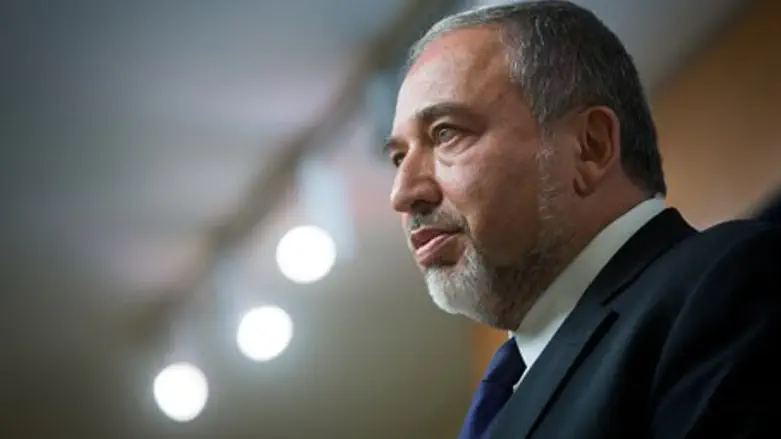
Foreign Minister Avigdor Liberman criticized the UN Security Council's pressure on Israel Tuesday, noting that the Palestinian Authority's (PA) demands to force Israel to withdraw from Judea and Samaria within a strict two-year timeline is part of "a political attack" on the Jewish state, fomented by the EU.
"Even the European Parliament [itself] will vote tomorrow to recognize [the PA as] a 'Palestinian state' in Luxembourg," Liberman said. "In addition, the Luxembourg Court of Justice will petition to remove Hamas from the EU's blacklist of terrorist organizations and the Geneva Conference will convene to sign the Geneva Convention - another step designed by Palestinians to condemn Israel and present it as aggressive and a violator of human rights."
"All these moves, joining other similar moves, some of which have already been made and others which will be carried out, are part of a planned organized and designed to force Israel to 'face facts,'" he continued. "This is a political attack we must deal with it in a smart and determined manner."
"The State of Israel will not agree to be dictated to by the Palestinians," Liberman declared. "Any attempt by the Palestinians, assisted by international bodies, to impose on us their desired solution, will only deteriorate the situation in the region even more and be liable to fail."
"To European countries that cooperate with the Palestinians, these moves are like those who bring the burning match to someone holding a powder keg in his hand," he continued. "They do not help anyone but are just operating from their own internal social and political interests."
Liberman not only called on the EU to stop fueling Palestinian fire, however; he also urged Israel to create its own solution.
"We must also act," he said. "We cannot sit idly by only saying that we oppose this."
"The lack of an Israeli initiative deteriorates our position in the international arena, will harm our relations with our friends in the West and will not allow us to stand up for the things that matter to us," he continued.
Liberman then pushed his plan to form strategic ties with the "moderate Arab world" and withdraw from the "triangle area" of mostly Arab towns in northern Israel.
"I've introduced the proposal that I thought would promote a regional arrangement, which, combined, would regulate our relations with Arab states, with the Palestinians and Israeli Arabs," he said. "I believe it will lead to a stable agreement with the Arab world and the Palestinians and strengthen Israel as a Jewish state."
"But even if at the moment there is no majority in the cabinet this proposal, we must take some initiative. Israel can not allow itself to be led - we must initiate and lead," he concluded.
Liberman has heavily promoted the idea of the "triangle swap" before, most recently earlier this year during the final stages of the last round of failed peace talks, in a plan that would extend the reach of a state of "Palestine" right into the center of coastal Israel.
The swap, which Israel reportedly offered the US in talks in December with Prime Minister Binyamin Netanyahu's support, refers to the area known as the Triangle in east-central Israel. The area includes the cities of Tayibe and Tira, in which about 300,000 Arab citizens live.
"Among us there are residents of Israel who are waving Palestinian flags in their communities, and Independence Day is not a holiday for them," he stated in April. "To me, the principle of exchanging territory and populations must be the basis for any agreement. We talked about it many times."
"I have never heard a rejection of this idea when I put it in front of world leaders," he added. "They only asked if it's practical."
He has also stated on multiple occasions that embracing the "moderate Arab world" is the plan for Israel's security in the Middle East.